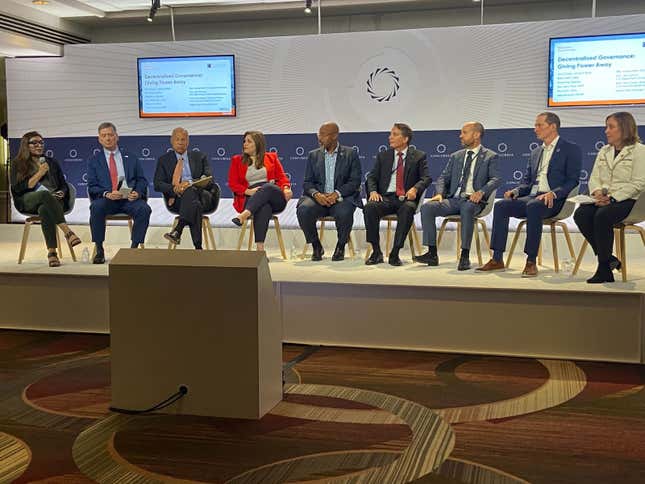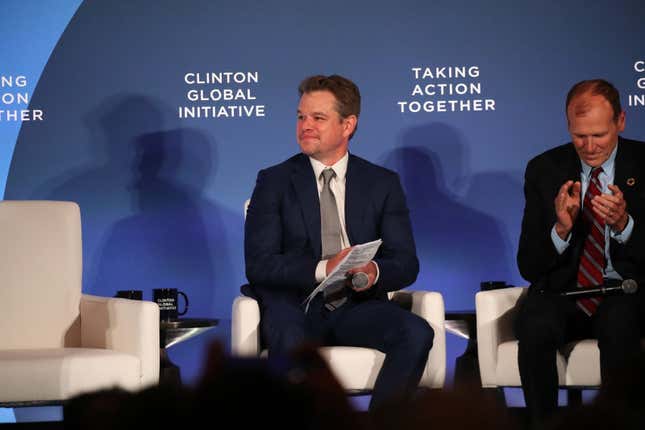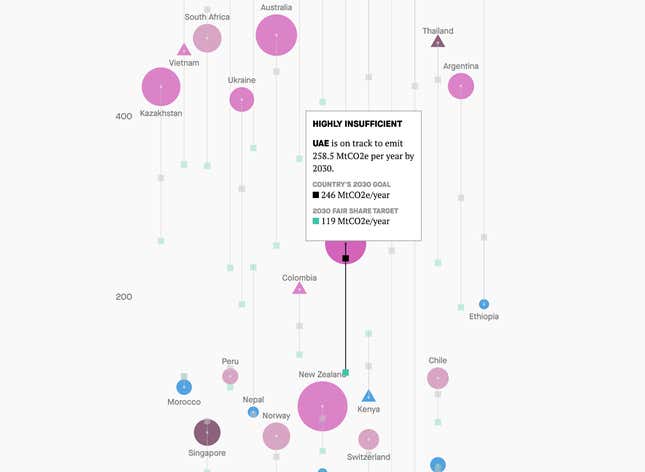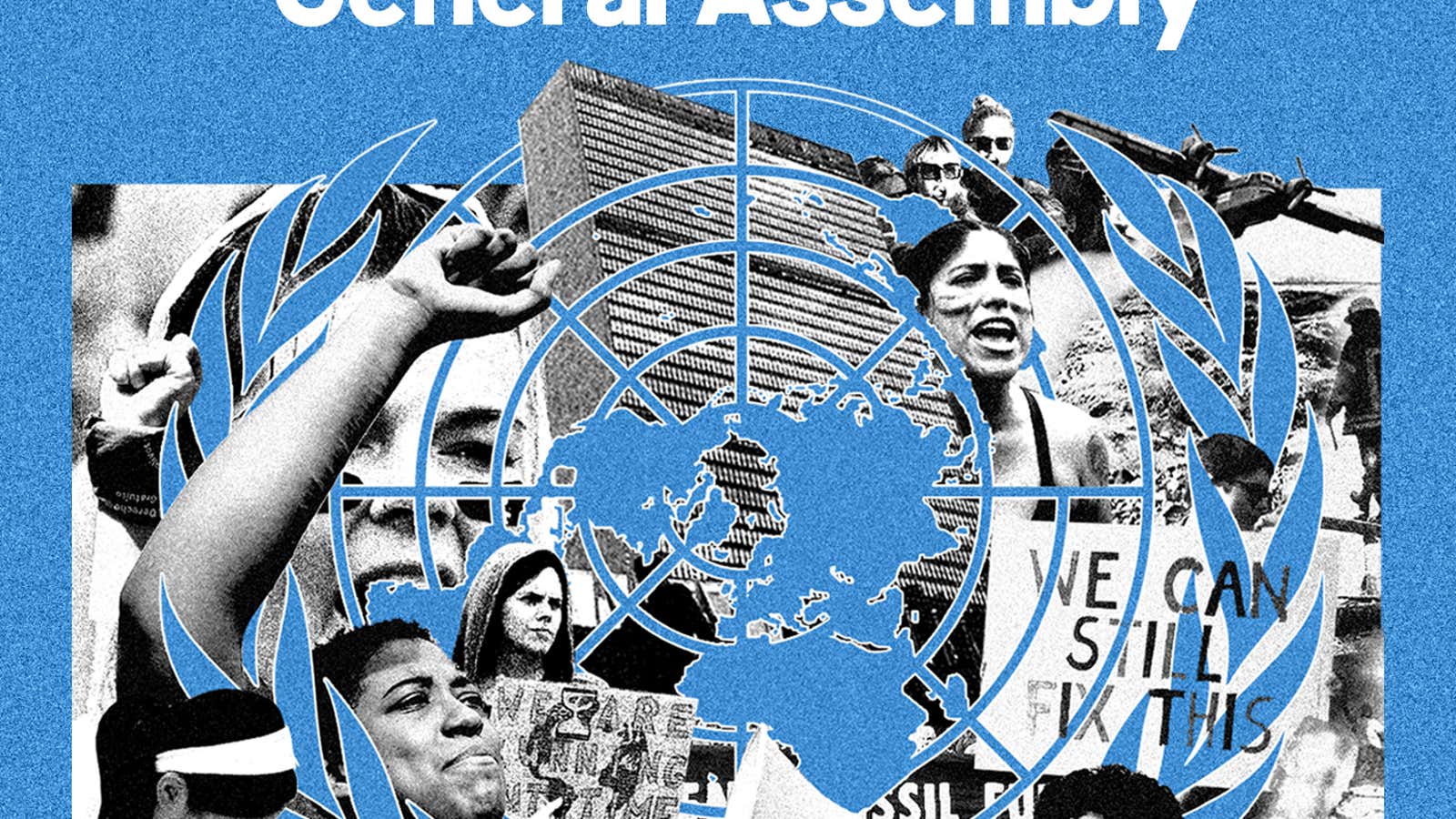Greetings, UN delegates and UNGA watchers!
Something about the UN General Assembly feels different. Events are back in person, sure. But between the remote attendance options, the postponement of US president Joe Biden’s speech to accommodate his attendance a Queen Elizabeth II’s funeral, and the covid rules keeping delegation sizes to a minimum inside the UN building, the typical traffic jams, security lines, and overall buzz are toned down this year, at least in and around UN Plaza.
Yet some things never change. As in years past, UNGA’s program is reliably rife with confusing event titles that are heavy on jargon and acronyms.
As per Quartz’s tradition, we have selected some of the most egregiously inscrutable ones, and attempted a plain-English translation.
Actual event: Partnering for Action: Implementation of the Global Accelerator on Jobs and Social Protection for Just Transitions
*Translation: We need more good jobs in poor countries, quickly
*Trucks are polluting and expensive, so we thought we’d combine shipments to save money and emissions
Countdown to the 2023 High-Level Meeting: Reception for PHC & UHC Advocates
*Powerful people will soon be invited to discuss Primary Health Care and Universal Health Coverage, drinks will be served
Partner or Perish: Prioritizing Collaboration to Multiply Impact
*Team work makes the dream work
*Digital spaces would be less sexist and racist if women and people of color had more power over them
Unlocking Sustainable Finance for Nature-Based Solutions
*Where to find money to save the bees
*No clue—we’ll just have to attend and find out
What’s the solution to the world’s pressing problems?
“I think money. Everything else is second order.”—Nobel prize-winning economist Abhijit Banerjee has a simple answer to a complex question. Read about his reasoning here.
How to moderate a 9-person panel
They walked on stage one by one by one by one… until there were nine of them—one fewer than planned due to a late cancellation, but still the largest panel we’ve seen yet this UNGA week.

Against all odds, the content at this Concordia Summit session was good. How did a group this size pull it off?
No introductions. If you have more than two people on a panel, you really should avoid boring the audience with recitations of long biographies. In this case, mercifully, pertinent background was briefly and elegantly folded into the opening question to, or response from, each panelist.
A hot-button issue. What more should Meta do to regulate content on Facebook and its other platforms? It’s a thorny issue, surely deserving of at least nine different perspectives. And on this panel, both the company and its critics were represented.
Masterful moderating. Ann O’Leary, a partner at the law firm Jenner & Block who previously worked in politics, made sure everyone on stage got multiple turns to speak. She also kept her own speaking time to a minimum, interjecting only when her experience—as a senior advisor to Hillary Clinton’s 2016 US presidential campaign, for example—was relevant to the topic at hand.
Mutual respect. No one hogged the mic, and disagreements were profoundly civil, which is really the only way to behave on a panel about what’s needed in social media discourse.
Adequate time. A full 90 minutes was allotted for the discussion, which was a great insurance policy against a superficial showing. As a lead programming sponsor at Concordia, Meta made sure it got what it paid for.
By the way
The US Supreme Court might have rolled back protections for abortion, but the US government is doing what it can to support reproductive care, at least internationally. After the Trump administration had cut all funds to the the UN Population Fund, the White House is set to make its largest contribution to it yet, becoming the main donor.
Person of interest
If Jeh Johnson looks relaxed this week, consider how the former US homeland security chief used to spend UNGA.
“This week, when I was in office, used to be my nightmare,” he said from the stage at the Concordia Summit. “2015 was the biggest one. We had 170 world leaders, including of course president Obama, Xi of China, Putin of Russia, and the pope, and the pope wanted no security.”
As Johnson noted, the pontiff famously enjoys going around his security detail to stop his motorcades and mingle with crowds. “So we gave him his popemobile, and I did not take a breath until I saw that airplane leave and go back to Rome.”

Quoted
“We’re OG CGI.”—Matt Damon, speaking at the Clinton Global Institute.
Damon noted that he first met his philanthropy partner at CGI in 2008. A year later, he and environmental engineer Gary White returned to the conference to pledge that their Water.org nonprofit would bring clean water and sanitation to 50,000 people in Haiti. Today, Water.org has helped 50 million people around the world.
The value of lived experience
“What the heck is the CEO of an alcohol company doing up here?” Pernod Ricard North America chief Ann Mukherjee felt compelled to raise this question herself from the stage of the Clinton Global Initiative, preempting any confusion in the audience during a session on climate change.
Indeed she was a seemingly odd fourth on a panel featuring Damon, White, and Kara Hurst, who heads up sustainability at Amazon, which this week announced a $10 million donation to Water.org’s new water and climate fund.
Mukherjee explained her presence this way: When your product relies on agave plants, you’re at least as much an agriculture company as you are an alcohol company. And when you have employees, you’re a steward to people and communities. “If we don’t do this right, we don’t have a business,” she said.
She also had a message for her fellow CEOs: “Hire people that are hungry for bringing together climate and nature as part of the business,” she said.
How can you tell who’s hungry? “I grew up in India. I had water rationed,” Mukherjee told the audience. “I got sick from bad water—I almost died. I had only eight hours of electricity some days to study for my board exams. I know what it’s like. Hire people like us. Hire more people like me and unleash the power of the experiences people have lived through to change tomorrow.”
Seen and heard
Manhattan’s Central Park Zoo was the perfect setting for an evening event about financing biodiversity, especially once the sea lions got going. From their habitat situated just steps away from the program tent, the slippery creatures barked their way through speeches given by Canadian prime minister Justin Trudeau and Ecuador president Guillermo Lasso, harmonizing with the French interludes offered by the former and the Spanish spoken by the latter. The provided translation headsets, unfortunately, were no match for the nature-positive noise.
News from elsewhere
Germany will nationalize gas giant Uniper... A total of €8 billion ($8 billion) will be injected into the country’s largest buyer of Russian gas to prop up a struggling energy sector.
...even as Vladimir Putin escalated the war against Ukraine. After Russia ordered 300,000 reservists to mobilize, one-way flights out of the country sold out.
European investment in China is falling. In the first half of 2022, greenfield investments from the EU and the UK dropped below $2 billion, compared to $4.8 billion last year, according to new research.
Brazilian firms are drumming up finance to save the Amazon. At a climate conference on the sidelines of the General Assembly, companies are hard-selling carbon credits. An area the size of Puerto Rico has been destroyed in the Amazon in the first half of this year—the most in 15 years.
Shanghai pitched a $257 billion infrastructure investment. Eight projects, including a new transportation hub and nature park, will aim to help revive the covid-hit economy.
Over 130,000 people in Japan still lack power. Typhoon Nanmadol, which hit the country over the weekend, also damaged a space center.
GOOOOOOALLLLLLLLL
In 2015, the UN member nations agreed to the Sustainable Development Goals, a series of ambitious targets meant to reduce poverty, fight inequality, and halt climate change by 2030. Throughout UNGA, we’re diving into a few of them to let you know how they’re going (spoiler: overall, not great).
Today let’s look at a big one. Goal number 13 is “Climate Action” and its aim is broad and imposing: take urgent action to combat climate change and its impacts.
To limit warming to 1.5°C, global emissions need to peak before 2025. Making sure this happens also has implications across the other SDGs. This is a crucial one to get right—and soon. No countries are pulling their weight, yet.

Even the pandemic-induced global shutdown didn’t help. Despite shuttered economies, fewer planes, decreased commutes, and stalled ships, the world’s pandemic pause barely dented emissions, and estimates suggest the world is back to its pre-pandemic upward trajectory.
Fear not—there’s a lot more UNGA to come. And when it’s all over, we hope you’ll join us as we unpack what occurred and what’s left to do. Register now for Gauging the Goals, a Quartz virtual event in partnership with the Gates Foundation on Oct. 6. And stay tuned for our next Need to Know: UNGA newsletter, coming to your inbox tomorrow.
— Heather Landy, executive editor; Annalisa Merelli, senior reporter; Amanda Shendruk, things reporter; and Morgan Haefner, deputy email editor
